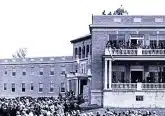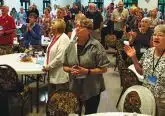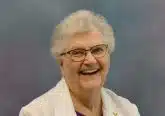Sisters of the Precious Blood timeline
Wednesday, October 7, 2009
1764: Maria Anna Probst born
1793: Maria Anna Probst marries John Baptist Brunner
1813: John Baptist Brunner dies, husband of Maria Anna Brunner
1832: Father Francis de Sales [son of Mother Brunner] purchases Loewenberg Castle that had been abandoned for 30 years
 |
| Maria Anna Brunner (Photo courtesy Sisters of the Precious Blood Archives.) |
1832: Mother Maria Anna Brunner goes to Rome for a nine month pilgrimage
1834: Two maids at the Loewenberg Castle join Maria Anna Brunner in nocturnal hours of adoration — beginning of the Sisters of the Precious Blood
1834: Mother Brunner obtained permission from the Bishop of Chur to lead a communal life with her small group of women
1836: Mother Maria Anna Brunner dies
1836: Sister Clara Meisen guided the Sisters after Mother Brunner dies
1837: Saint Gaspar del Bufalo dies
1838: Father Francis de Sales Brunner becomes a Missionary of the Precious Blood
1844: Father Brunner brings Missionaries and Sisters of the Precious Blood to America [Peru, Ohio]
1844: Mary at the Crib Convent, New Riegel, Ohio [1st major Foundation – Cradle of the Community]
1845: Mary of the Angels Convent, Marywood [Thompson/Frank], Ohio [near Bellevue] [2nd major Foundation]
1846: Mary, Help of Christians Convent, Maria Stein, Ohio [3rd major foundation]
1847: Father Francis de Sales Brunner sends Mother Mary Ann Albrecht to Europe to look for recruits
1849: Mary at the Holy Sepulcher Convent, Glandorf, Ohio [4th major foundation]
 |
| Mary at the Crib Convent, established 1844 at New Riegel, Ohio (Photo courtesy Sisters of the Precious Blood Archives.) |
1849: During the next nine years Father Francis de Sales Brunner makes four trips to Europe
1850: Mary, Mother of Good Counsel Convent, Maria-Camp Convent, near Glandorf, Ohio [5th major foundation]
1850: Mary, Mother of God, Gruenenwald Convent, near Cassella, Ohio [6th major foundation]
1850: The last Sisters from Loewenberg, Switzerland emigrated to Ohio
1852: The Visitation of Mary Convent, Minster, Ohio [7th major foundation]
1852: Mary, Mother of Mercy, Himmelgarten Convent, near St. Henry, Ohio [8th major foundation]
1854: Mary’s Home Convent, Jay County, Indiana [9th major foundation]
1855: The Congregational membership is 224
1856: Mary’s Flight into Egypt, Egypt, Ohio [10th major foundation]
1859: Father Francis de Sales Brunner dies
1866: Father Joseph Albrecht breaks off from St. Joseph Parish and Hemmelgarten Convent
1875: Father Gartner donated a large collection of relics to the Sisters at Maria Stein
1887: Sisters separated from Missionary Priests and Brothers of the Precious Blood to become a Diocesan Community
1888: For the first time: Constitution, uniform habit, perpetual adoration, vows taken by all
1897: Mother M. Emma Nunlist spearhead a diversity of apostolic ministry across the Country
1903: Sisters start ministry in Arizona under the leadership of Mother M. Emma Nunlist
1912: The last group of Postulants came from abroad [there were well over 800 European born Sisters in the Community]
1917: Work in diverse ministries: Archbishop’s House, Fenwick Club, Catholic Sisters’ College
1923: New Motherhouse [Salem Heights] in Dayton, Ohio under Mother M. Emma Nunlist
1930: The Congregation builds the Maria Joseph Home for the Aged [a non-sectarian home for elderly men and women ]
1933: Mother M. Agreda Sperber brings the remains of Mother Brunner from Switzerland to Dayton, Ohio for veneration
1936: Congregational membership is 679 Professed; 29 Novices; 15 Postulants; 4 Aspirants
1946: Congregation became a formally recognized pontifical institute, known
officially as the “Congregation of the Sisters of the Precious Blood.” [during Mother M. Magna Lehman’s leadership]
1954: The Congregation established a cloister at New Riegel, Ohio
1955: The Sisters changed from the black habit to the gray habit
1957: The Congregation established ministry in Chile, South America
1960s: Sisters have the option of returning to their baptismal name
1960s: Sisters have the option of changing from the habit to wearing contemporary dress
1966: Sister Rosella Hess led the Sisters through Vatican II changes
1979: The Sisters at Salem Heights and the elderly laity from the Maria Joseph Home for the Aged exchanged buildings
1980: The remains of Mother Brunner were taken from the chapel and buried in the Salem Heights Convent Cemetery
1985: The 1923 Salem Heights building is sold to Samaritan Health Resources
See related story: Sisters of the Precious Blood mark 175th anniversary













